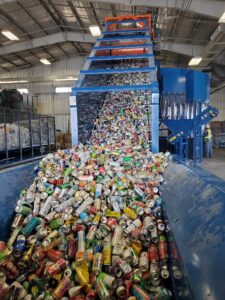By Jill Carstens
Among the unassuming warehouses and factories in Globeville, a recycling revolution is in progress. Revolution Systems founder and lead engineer Dan Alsop, a Denver native, has tenure improving the outdated materials recovery facilities (MRFs) that have monopolized the industry.
He struck out on his own during the last decade to innovate the world’s smallest and most efficient patented recycling platform, which is headquartered at 4935 Pearl St. The typical MRF platform used nationally requires about 13,000 square feet and usually about 30 workers facilitating a conveyor belt as they sort through the materials.

Alsop’s design is round, requiring only two or three workers to sort items in multiple sorting bins as it revolves around them. Teamwork is enhanced as workers are near one another. Alsop uses LEAN techniques, incorporating material flow analysis and team dynamics, reducing delays and lowering overall cost. LEAN principles are founded on two pillars: respect for people and continuous improvement. The Revolution system is 30% more efficient than bigger MRFs.
“The recycling infrastructure has virtually gone unchanged for the last 30 years until this design showed up,” said John Armstrong of B1 Energy in Chaffee County.
Armstrong is hoping to secure one of Alsop’s machines for a new recycling facility near Salida.
“This platform checks all the boxes for us to become more independent with our recyclable waste as well as to make it happen in a much more sustainable way,” he said.
“Education is becoming more critical,” said Kevin Andresen, Revolution’s head of sales, “For multi-stream recycling to happen, residents need to begin to understand more about what can be recycled and how. Yes, you do need to rinse out recyclables, and grease on a pizza box can contaminate an entire 2-ton bale of cardboard.”
To keep it simple, Andresen says that residents need to become familiar with the numbers on recyclable plastics. Numbers 1 and 2 are currently the most widely processed.
“And please take the lids off of soda and water bottle containers, they impede the bailing process,” Andresen said.
Alsop and his team have also developed a mobile unit, “The Roadie,” a version of their system that can travel to large events, like outdoor concerts where managing a large amount of recycling in a short amount of time can be challenging.
“We take the Roadie out to high schools and colleges to educate students,” Alsop said. In the last five years, the international market for purchasing recyclables has become less reliant.
Since then more domestic manufacturers have been using recycled materials for production. New, sustainable systems like the Revolution- based one Armstrong is working on in Salida help enable smaller municipalities to become independent in their ability to sell their recyclable materials.
This keeps the process local and allows smaller towns to take in more of the profits. Reducing the amount of energy used to run these machines is also a top priority. Alsop designs with customization in mind.
“As we progress and learn the unique needs of each customer, we continue to develop ways to make our platform more efficient,” he said.
This design works effectively for remote cities like Salida and Steamboat Springs, which previously were spending substantial time, money and fuel to transport their recyclables to Denver or Colorado Springs. Chris Lyons of Shamrock Disposal in Salida has had to use his trash pickup vehicles to drive to Colorado Springs every week.
“These trucks just weren’t made for long-distance commuting. I’ve had to spend a lot of money on repairs,” he lamented.
Steamboat Springs acquired Revolution’s first prototype MRF system in 2016, which, according to Twin Enviro Services controller Lacie Coup, got their town to recycle more.
“Because it is so adaptable, we know we can add new abilities and services when the opportunity arises,” she said.
When asked if the Revolution system could replace the behemoths that have served big cities for so long, Alsop contended that although the smaller machines process less in a day than the big machines, their efficiency and cost effectiveness would make sense over time.
“Instead of the trucks driving from the far edges of metro Denver to get to these large MRFs, creating several smaller facilities over the span of the city would cut down on that travel time and fuel usage,” he said.
The 30 workers it usually takes to run the typical MRF could be spread out over several locations.
“A lot of recyclables also get missed or overlooked in a larger facility,” he added.
Free recycling for all Colorado residents is scheduled to go into effect in 2026. Landfills have been identified by the EPA to emit heat-trapping methane gas, a major cause of climate warming. Colorado only processes single-stream materials, and the rate of waste diverted from landfills lags at about half the national average.
While the details are yet to be announced, state officials have declared Coloradans will divert 45% of their waste to recycling before 2036. Revolution is well positioned to accommodate more dual or multi-stream recycling, enabling the ability to process more types of material.
Venissa Ledesma of the Colorado Department of Public Health and Environment offered that a statewide needs assessment will evaluate the recycling infrastructure throughout the state to help create the plan for this goal.
“We expect the plan will call on many businesses to innovate and to expand our recycling infrastructure, especially in smaller-sized communities in underserved areas. We will need all hands on deck to meet our goals,” Ledesma said. “Revolution Systems could be among the businesses selected to help execute the plan. That will be determined through the program development and implementation process.”

Be the first to comment